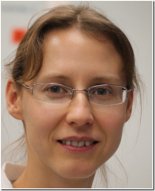Researchers from Rice University and the University of Texas MD Anderson Cancer Center have discovered potential new drugs that work in concert with other drugs to deliver a deadly one-two punch to leukemia. The potential drugs are still years away from being tested in cancer patients, but a recently published study in the journal Leukemia highlights their promise and the innovative methods that led to their discovery.
In previous studies, the research groups of Rice biochemist Natasha Kirienko and MD Anderson physician-scientist Marina Konopleva screened some 45,000 small-molecule compounds to find a few that targeted mitochondria. In the new study, they chose eight of the most promising compounds, identified between five and 30 closely related analogs for each, and conducted tens of thousands of tests to systematically determine how toxic each analog was to leukemia cells, both when administered individually or in combination with existing chemotherapy drugs like doxorubicin.
During times of extreme stress, cells can temporarily forgo mitophagy to get an emergency energy boost. Cancer is notorious for hijacking these sorts of programs to fuel pathological growth. For example, previous research has shown leukemia cells have far more damaged mitochondria than healthy cells and are also more sensitive to mitochondrial damage than healthy cells.
Natasha joins us today to discuss her findings.
Selected Podcast
EP 1109B - Chemotherapies that Target Mitochondria: New Leukemia Killing Compounds

Featured Speaker:
Her research focuses on mitochondria, organelles that are not only the powerhouses of living cells but also biochemical factories, energy managers, and monitors of cell health. When mitochondria are damaged, cells have two options: repair or recycle. Failure isn’t an option, because a buildup of disabled mitochondria can trigger the cell to kill itself via programming that rids the body of abnormal and unhealthy cells.
Kirienko and collaborators at The University of Texas M.D. Anderson Cancer Center and other institutions in Houston’s Texas Medical Center are seeking to exploit this cellular suicide program by developing new anticancer therapies that deliberately damage mitochondria and trigger cancer cells to kill themselves.
Prior to joining Rice, Kirienko was a postdoctoral researcher at Massachusetts General Hospital and Harvard Medical School. She earned her bachelor’s degree in biochemistry from Russia’s Southern Federal University and performed her master’s research at the Institute of Protein Research at the Russian Academy of Sciences. As a Ph.D. student in molecular biology at the University of Wyoming, Kirienko used worms called nematodes as a model organism to investigate the retinoblastoma protein. Retinoblastoma suppresses tumors by regulating cell division, and part of Kirienko’s work focused on identifying cell-cycle genes that were regulated by retinoblastoma.
Upon moving to Harvard in 2010, Kirienko studied Pseudomonas (soo-duh-MOW’-nuhs) aeruginosa (eh’-ruh-GIHN’-oh-sah), a drug-resistant pathogen that often infects cancer patients and is also a leading cause of death among cystic fibrosis patients. During those studies, she learned the pathogen could cause mitochondrial dysfunction, a discovery that set the stage for her research into new forms of chemotherapy.
Natasha Kirienko
Natasha Kirienko is an Associate Professor in Biosciences at Rice University and a CPRIT (CEE'-priht) Scholar in Cancer Research with the Cancer Prevention and Research Institute of Texas. She was recruited to Rice in 2015 with a $2 million Tenure-Track Award from CPRIT, the largest state cancer research funding agency in U.S. history.Her research focuses on mitochondria, organelles that are not only the powerhouses of living cells but also biochemical factories, energy managers, and monitors of cell health. When mitochondria are damaged, cells have two options: repair or recycle. Failure isn’t an option, because a buildup of disabled mitochondria can trigger the cell to kill itself via programming that rids the body of abnormal and unhealthy cells.
Kirienko and collaborators at The University of Texas M.D. Anderson Cancer Center and other institutions in Houston’s Texas Medical Center are seeking to exploit this cellular suicide program by developing new anticancer therapies that deliberately damage mitochondria and trigger cancer cells to kill themselves.
Prior to joining Rice, Kirienko was a postdoctoral researcher at Massachusetts General Hospital and Harvard Medical School. She earned her bachelor’s degree in biochemistry from Russia’s Southern Federal University and performed her master’s research at the Institute of Protein Research at the Russian Academy of Sciences. As a Ph.D. student in molecular biology at the University of Wyoming, Kirienko used worms called nematodes as a model organism to investigate the retinoblastoma protein. Retinoblastoma suppresses tumors by regulating cell division, and part of Kirienko’s work focused on identifying cell-cycle genes that were regulated by retinoblastoma.
Upon moving to Harvard in 2010, Kirienko studied Pseudomonas (soo-duh-MOW’-nuhs) aeruginosa (eh’-ruh-GIHN’-oh-sah), a drug-resistant pathogen that often infects cancer patients and is also a leading cause of death among cystic fibrosis patients. During those studies, she learned the pathogen could cause mitochondrial dysfunction, a discovery that set the stage for her research into new forms of chemotherapy.
Tagged under